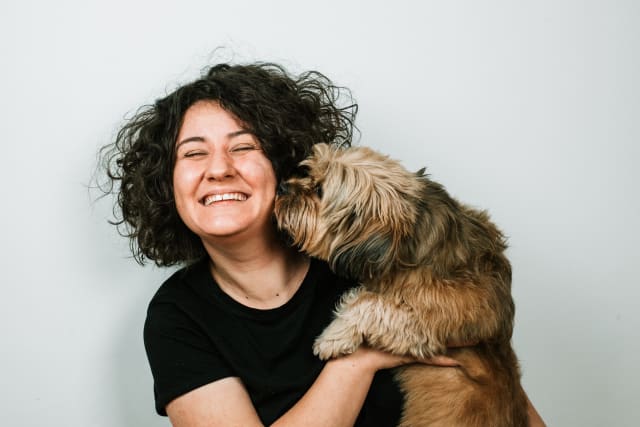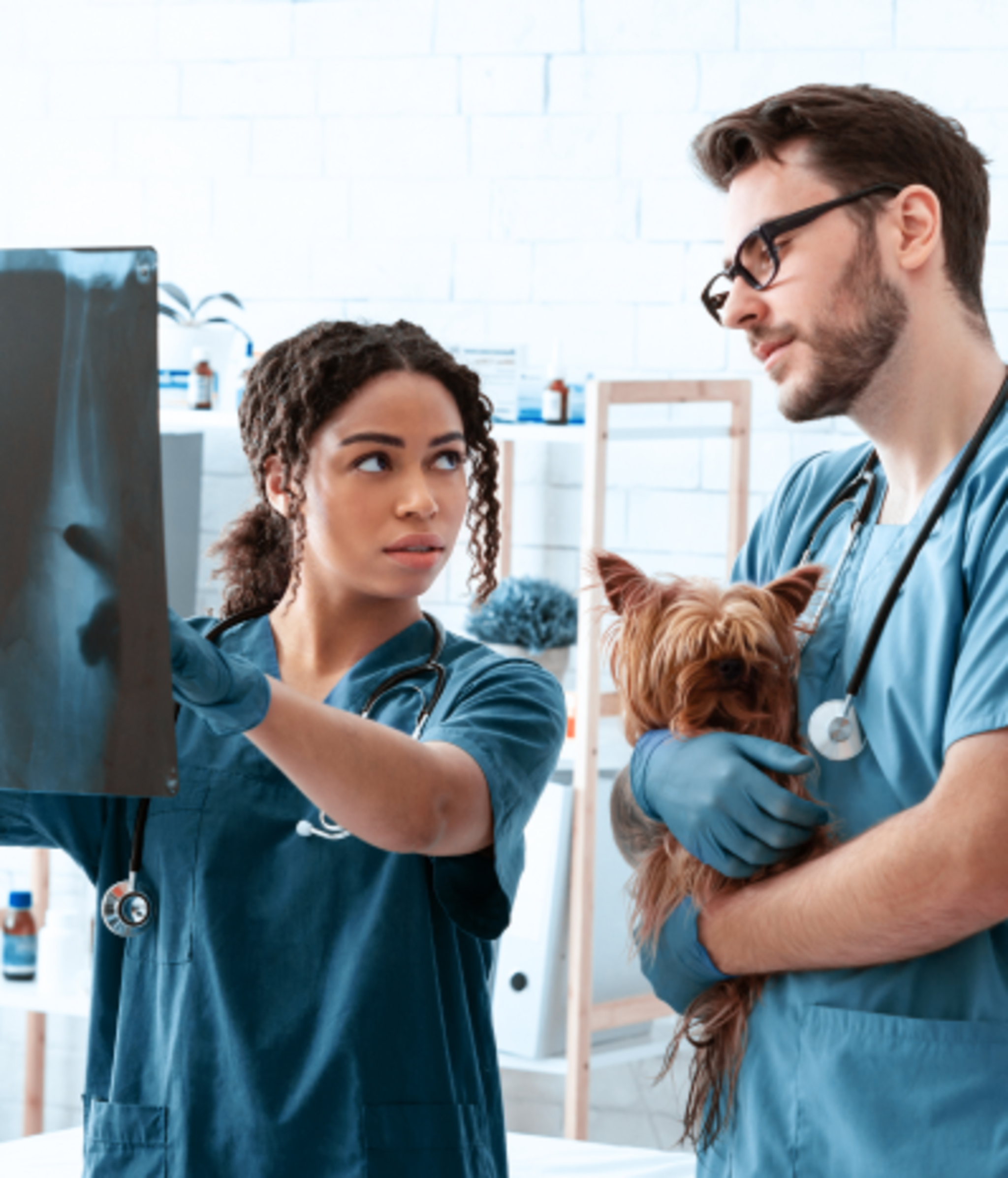
Connecting pets with cutting-edge medicine
Our mission is to connect our furry friends in need of treatment with the latest advances in veterinary health.







How does AniTrial work?
Study Recruitment Process
1
Publication and Promotion
A clinical study is published and promoted on TRIAL Recruit, both online and through our network of veterinarians.
2
Application and Screening
New patients can apply for the study through pet parents or veterinarians, and our recruitment coordinator contacts them within 24 hours for information, screening, and collects additional details for the pre-screening process.
3
Scheduling the Clinic Visit
The recruitment coordinator collaborates with the trial site and pre-screened pet owners to schedule an in-clinic visit.
4
Screening and Swag Bag
The coordinator ensures the pet owner is prepared for the screening visit, and regardless of enrollment, they receive a mailed swag bag as a token of appreciation for their participation in pet health.
A clinical study is published and promoted on TRIAL Recruit, both online and through our network of veterinarians.

Featured Studies

Performance of a New Point-of-care Rapid Test to Diagnose Pulmonary Coccidioidomycosis
Diagnosis of coccidioidomycosis in dogs is challenging due to the fact that the symptoms are not specific for this disease. Coccidioidomycosis can be diagnosed via a biopsy however the most common method is testing for antibodies to the fungus. These tests are often sent to third party labs delaying confirmation of the disease. This study looks to evaluate a potential point of care rapid test which would be able to provide a positive or negative result indicating the presence or absence of antibodies, respectively, within 30-60 minutes.
The diagnosis of pulmonary coccidioidomycosis can be difficult because clinical signs overlap with many other respiratory tract disorders and dogs can have positive Valley Fever antibody titers without active clinical infection. Acute phase proteins are useful biomarkers for many other disorders and our hope is to determine whether they can facilitate making a diagnosis of pulmonary coccidioidomycosis in dogs.
For additional details or questions please contact Dr. Jaffey ([email protected]).

Efficacy of twice-daily nebulized budesonide for the treatment of canine chronic bronchitis and eosinophilic lung disease
Canine chronic bronchitis and eosinophilic lung disease are inflammatory diseases characterized by cough for > 2 months without another identifiable cause. Dogs with chronic bronchitis have persistent airway neutrophilic inflammation. The foundation of long-term therapy is corticosteroids. Oral prednisone is commonly used but has a litany of possible adverse effects. Inhaled steroids is an alternative to avoid the adverse effects of prednisone but the only available option is fluticasone. This medication is expensive and has variable efficacy. Inhaled budesonide is a medication used in humans to treat a similar airway disorder and is a fraction of the cost. This study aims to investigate the benefit of inhaled budesonide on respiratory tract symptoms in dogs with inflammatory airway disorders.
Meet our partners
We're proudly trusted by esteemed institutions for continuity of care for your pet.



Find a study site near you
Discover ground breaking possibilities in veterinary medicine.
Study Sites Nearby
- Manley Animal Hospital
- 3812 SE Adams Rd(918) 333-7286•192 miles
- VCA Animal Diagnostic Clinic
- 4444 Trinity Mills Rd Ste 1009722678300•420 miles
- Midwestern University Companion Animal Clinic
- 5715 W Utopia Rd623-806-7387•870 miles
- University of Georgia
- 2200 College Station Rd706-296-7818•885 miles
- Cornell University Hospital for Animals (CUHA)
- 930 N Campus(607) 253-3060•1149 miles
- Cummings School of Veterinary Medicine Tufts University
- 200 Westboro Rd Rm 703508-887-4669•1393 miles
FAQs
How is my pet protected from injury in a study or a trial?
Your pet is protected first and foremost by being told honestly and without bias what the known and potential risks are for participating in the trial. This information will be submitted to you in a language you will be able to understand. There is an Institutional Review Board (IRB) requirement that every participant in a clinical trial be informed about the possible risks, benefits and available alternatives. All of the information necessary to assist you in determining whether or not your pet should participate in a clinical trial is provided in a document called the "informed consent document." This document informs you of how to let the investigator know if you think your pet is experiencing a problem with the research and what resources are available to help you. You should ask any questions you may have about a clinical trial before signing the informed consent document. Even after you have signed the informed consent document to have your pet participate in a clinical trial, you should always speak to the investigator if you have questions or problems.
What questions should I ask before signing up for a clinical trial?
- If my pet is ill, will this research help them?
- What are the risks?
- What is involved? What will I have to do?
- Will I be charged anything or compensated for my participation?
- How can I end my participation if I change my mind?
- What will happen when the study is over? Will I be told the results?
- Is the study controversial?
- Whom do I contact to express concerns or obtain information?
What is informed consent?
Informed consent is a process that helps you learn about the research study. After learning about the study, you will be able to ask the researcher or his/her staff questions. You should only agree to take part after you clearly understand the study and feel comfortable. You should take time to talk over your decision with your doctors, family, and friends. If you agree to take part, you will be asked to sign an "informed consent form."
What should I consider before agreeing to have my pet participate?
You may consider having your pet participate in a study because:
- They may benefit from the best possible treatment or an experimental treatment that would otherwise not be available.
- The veterinarians and technicians will closely monitor your pet’s progress throughout the trial.
- You would be helping researchers to improve the treatments for future patients.
You might consider not taking part in a study because:
- The experimental treatment may not work for your pet, or it could make your condition worse.
- The experimental treatment may cause side effects that no one anticipated.
- If the trial is randomized and includes a placebo (an inactive, dummy pill), your pet may not be given the experimental treatment.
- The amount of testing for efficacy and safety purposes may involve too many trips to the research office and take too much time.
There is no guarantee that a clinical trial will help your pet’s condition, but the results will contribute to knowledge that may make a difference in the future care of patients.
What are my rights as a research participant?
- You have the right to not take part in a research study.
- You have the right to drop out at anytime.
- You have the right to be given new information about the study.
- You have the right to ask questions at any time and have them answered as soon as possible.
- You also have the responsibility to stay informed during your participation in a study. You should ask questions about anything you do not understand or simply want to know.
What is a clinical trial?
Doctors and scientists take part in many kinds of research studies. Clinical research helps researchers understand how best to treat patients or helps them learn more about a particular condition or disease. There are many different forms of clinical research. One common form is a clinical trial. In a clinical trial, researchers test new drugs, medical devices or treatments.
Clinical trials may seek to discover new drugs, new ways of giving patients approved drugs, new combinations of approved drugs, new surgical techniques, devices, or biological products. Clinical trials are also conducted to test cutting-edge and novel therapies, like studies that involve gene therapy or gene transfer.
What is a randomized trial?
Randomized is used to describe a research study that hopes to compare two or more different treatments or procedures. Randomized means that your pet will be assigned to a study group by chance, like flipping a coin.
After the study is over can I continue to receive the study medication?
Generally, participation ends when the study ends because it might not be safe or effective to continue treatment based on what is known at the time. Sometimes patients can remain on the study drug if they are responding to the new treatment; however, this is the exception rather than the rule.
How are research subjects protected?
The Institutional Review Board (IRB) protects people and animals in research studies. The IRB includes scientists, non-scientists, and community members. The IRB reviews, approves, and monitors all in which pets take part. This oversight keeps risks to research participants as low as possible. The IRB also keeps track of ongoing studies to make sure they are being done in the right way.
Will it cost me anything to take part in a research study?
Clinical trials test new drugs, devices, or treatments. In some cases, taking part will not cost you anything. In other studies, the research team may bill you for drugs, devices, and services they provide. The study informed consent form will describe any costs to you in detail. If the information in the consent form is not clear, you should ask the research team to explain any costs before you sign the consent form.
Do research participants get paid?
This varies by study and will be covered in your Informed Consent Document.
If I withdraw my pet from a randomized trial, will I be told if they received the placebo (an inactive, dummy pill) or the active drug?
Most randomized trials will only disclose this kind of information when the study has been completely finalized; this is done to protect the integrity of the research data and results. If the trial is a "double-blind" trial, the doctor will not even know which substance your pet received. Most protocols will have information with respect to when a study will be "unblinded." If this is something that you want to know more about, ask the investigator what the study's policy is before you agree to participate.
